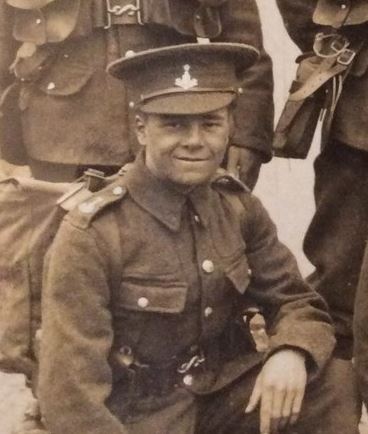
Wilfred was born in March 1896 in Marske by the Sea near Redcar on the East coast. When he was young his family moved to Middlesbrough where his father worked in the steelworks. Wilfred was training as a draughtsman when war broke out. Wilfred was just 5’ 2’’ tall, an inch shorter that the regulation height. But due to the great manpower losses he eventually got his chance in early 1915 when recruitment standards were somewhat relaxed. He enlisted in the 4th Battalion.
It was in November of 1916 in the latter stages of the Somme offensive that the work party that Wilfred had volunteered for came under fire. On his way back to his own lines he was caught by a shell explosion. He was taken to a hospital at Abbeville where his left arm was amputated.
Back in England Wilfred had to adjust to life without a limb. He was classed as ‘incurably unemployable’ and found it impossible to get a job. He used his time to study employment law and became a ceaseless campaigner for better conditions of his fellow jobless war wounded. He would continue to do so even when after he eventually gained employment. He was instrumental in establishing one of the first branches of BLESMA (British Limbless Ex-Servicemen’s Association) in Teesside.
He married Elsie and his daughter Sylvia was born in 1932. However, his fifty cigarettes a day habit for most of his life would take their toll. He died of lung cancer in 1958, just 62 years old.
Wilfred recorded his military and civilian campaigns in a diary that spent years in the loft of his daughter’s home in Middlesbrough. His family edited the diary into a testimony of one man’s war experience and his fight against injustice and discrimination. The book is called ‘Wasted Effort: A Journal of the First World War’.
Explore more memories from the ribbon
-
James Scott Bainbridge
Submitted by Pat Burgess. James Scott Bainbridge was born on 10 October 1887, the youngest of three sons, to William and Isabella, the family lived in Ravensworth. On leaving Barnard Castle school he joined the staff of the chemical laboratory of Rowntree & Co. of York. He subsequently spent three years at Leeds University where he graduated Bsc with first class honours in chemistry; he also took the Associateship of the Institute of Chemists, later becoming a Fellow of that Institute. He returned to the staff of Rowntrees and remained there until just before the war, when he was appointed chemist to the Thorne Colliery Company. James did not take up this appointment, as upon the outbreak of war he enlisted as a private in the Yorkshire Regiment, along with his two brothers. His abilities and qualities were soon recognised, and promotion came quickly. As a Company Sergeant Major he went with his battalion to France. When the men of his section experienced attacks of poison gas he was enabled, by his expert knowledge of chemistry, to protect them. He was mentioned in despatches in 1915, and received a commission on 22 November of that year. Shortly afterwards he was wounded. He was promoted to Lieutenant on 1st July 1917 and appointed Adjutant on the death of Capt Sproxton on 20 July, and promoted to Acting Captain on 3 August 1917. Capt James Scott Bainbridge was mentioned in Sir Douglas Haig’s Despatch of 7 April 1918 for distinguished and gallant…
-
Earnest Tewson
Colin Parker’s Grandfather, Earnest Tewson A/Cpl 13277 joined the Yorkshire regiment in Eston. He was awarded the Distinguished Conduct Medal, 1915 Star, British War Medal and Victory Medal. This was for conspicuous gallantry and devotion to duty. He held onto his post, after his platoon commander had been killed, and only withdrew when the situation was secure, and all his ammunition and bombs had been expanded, he saved the whole line from been turned. After the war, Earnest worked at Dorman Long, married Ava (Abby), and went on to have two children Elsie and Lily (Mr Parker’s mother), and lived in Grangetown, near Eston.
-
John Avery
John Avery was a miner and lived at Felling on Tyne, Co. Durham. He was married to Elizabeth Anne Speight. He was 29 years old when he enlisted at the outbreak of war and was initially posted to the 10th Battalion but subsequently served in the 11th and 8th. John suffered a gunshot wound to two fingers on his right hand in September 1915 and subsequently from the effects of gassing and shell shock. He was posted to the reserves in early 1917 and sent to work at Heworth Colliery, Felling on Tyne. Due to his wounds he was unable to work full weeks and he applied for a disability pension. He was granted 12 shillings and 6 pence a week to rise to 13/9d and subject to review after 48 weeks. He was awarded the 14/15 Star, the British War Medal , the Victory Medal and a Silver War Badge.
